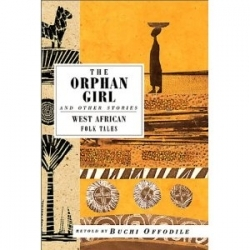The Orphan Girl and Other Stories
West African Folk Tales
“I compiled this volume to help preserve a dying culture,” states the author, a Kent State professor and storyteller. Offodile’s threatened culture is the “traditional moonlight storytelling culture of the agrarian society” of West Africa where he grew up. TV now replaces the magic of native stories and, fearing the loss of a largely spoken culture, the author traveled the countries of West Africa, going from village to village to search out the elders and record their stories.
Offodile’s love for his childhood experiences is apparent in the poetic language he uses in his introduction. “When the storytelling session was held indoors, perhaps during a thunderstorm, the children gathered around a fireplace with the storyteller, while ears of maize (corn) fresh from the farm, black pears, or coconuts roasted. The maize crackle-popped and the black pear spewed its juice into the fire, teasing it into a frenzy.”
Indeed, the introduction holds as much information and fascination as the collection of stories, for Offodile gives a brief account of the West African people, the role of religion, and the culture including food, songs, architecture, family, marriage, and the role of women.
The collection of stories is divided by country of origin, and ordered alphabetically, beginning with Benin and ending with Togo, the largest section of almost 100 pages given to the stories of Nigeria. At the beginning of each country is a simple map of the area indicating its location on the continent and the origins of the stories, and facts about the country, its geography, and its society, listing languages, ethnic groups, population, and religions; Christianity and Islam are the most dominant.
The stories themselves point to the common themes of being human and are grouped in the index under headings of Adventure Tales, Tales About the Gods, Tales About the Family, Tales About Ingratitude, and Trickster Tales. The reader can hear the language of the continent in characters like leopard, elephant, and lion. For example, there is the story of “The Serpent Groom” about a beautiful young girl, spoiled by her doting parents, who refuses any arranged marriages and finally chooses a handsome stranger in the village. Heedless of advice, she insists on marrying him immediately only to discover upon returning to his home that he is a python.
Another simple tale, “How the Crab Got Its Shell” tells of a crab who tries to help a young girl abused by her grandmother. For his efforts the angry grandmother throws her calabash pot at him. The broken calabash becomes his shell. In Offodile’s translation, the reader can’t help but hear echoes of Aesop’s Fables, Grimm’s Fairytales, and the Native American tales of North America—a reminder of how small the world really is and how much those gathered round the storyteller’s fire have in common.
Disclosure: This article is not an endorsement, but a review. The publisher of this book provided free copies of the book to have their book reviewed by a professional reviewer. No fee was paid by the publisher for this review. Foreword Reviews only recommends books that we love. Foreword Magazine, Inc. is disclosing this in accordance with the Federal Trade Commission’s 16 CFR, Part 255.

